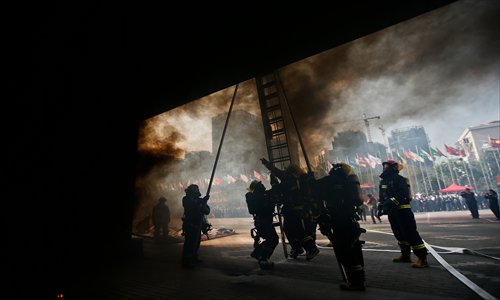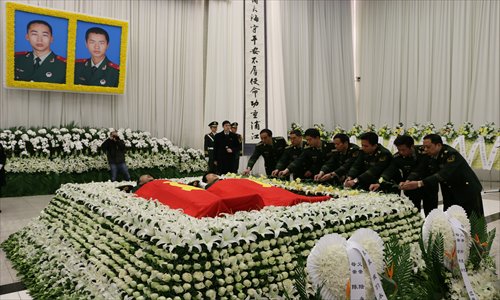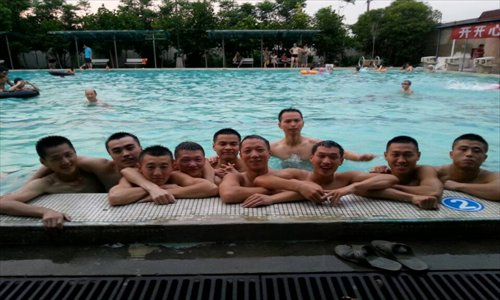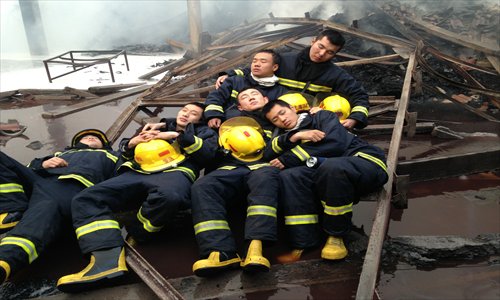Soldiers battling blazes

When most Chinese were relaxing with their families on the fifth day of the Spring Festival holiday, two young men were killed as they battled a blaze in a warehouse in Baoshan district. Firefighters Lu Chen, 23, and Sun Luoluo, 18, died when a wall collapsed on them as they were hosing down paper and paper products in the warehouse.
They were part of a team of 300 firefighters and 30 engines who had been battling the huge blaze for two hours. Without warning the wall next to them collapsed burying them and two other firefighters under bricks, beams and flooring. Immediately fellow firemen rushed to their aid, dragging debris from the huge pile of rubble.
Two firemen were rescued alive and sent to hospital for treatment. Firemen used sniffer dogs and electronic detectors to locate the other two, but sadly by the time the rescuers reached Lu and Sun it was too late.
Lu and Sun are just two of 40 Shanghai firemen who have died in the course of duty since 1958. The website of the Shanghai Fire Protection Association proudly lists the names of all the firemen who have died in action.

Specially selected
Lu and Sun were members of the 32-strong Luodian Fire Brigade in Baoshan district. Throughout the city there are 122 brigades which are made up of 8,800 firefighters and officers - 7,200 soldiers of the People's Liberation Army (PLA) and 1,600 civilians.
Unlike Western countries, where firefighters are civilian employees, in China most firefighters are soldiers. These specially selected PLA soldiers go through normal military training for up to two and a half months before undergoing specialist firefighting training for another two or three months. They are then assigned to a brigade.
Firefighters retain their army ranks beginning as privates, then junior sergeants, sergeants, staff sergeants and chief sergeants. The most senior rank is chief sergeant class 1. In Shanghai more than half of the firefighters are junior sergeants, sergeants or staff sergeants.
Privates serve as firefighters for two years then rise to become junior sergeants and sergeants for three years, staff sergeants to chief sergeants class 2 for four years and chief sergeants class 1 until they retire. Every soldier-firefighter has to submit an application to continue working and to rise to the next rank at the end of the term for each rank. If his or her application is turned down he or she is discharged from the army.
Soldier-firefighters are paid normal PLA rates and salaries. After they have served for 12 years or longer soldier-firefighters are guaranteed outside employment, usually in government-backed public institutions or State-owned companies in their hometowns. Although there are woman firefighters at present they are not deployed in frontline firefighting.
In recent years, few people have applied to be civilian firefighters and few applicants have passed the rigorous admission tests, said Zhang Shenhua, a press officer from the Shanghai Municipal Fire Bureau. Almost all frontline firefighters are soldiers.

Frightened and excited
Twenty-five-year-old Shandong man Li Linze joined the People's Armed Police Force under the PLA when he was 20. He worked alongside Lu and Sun at the Luodian Fire Brigade.
Li, now in his first year as a sergeant, recalled his first big fire which broke out in the year he was assigned to the Luodian brigade. A fire at a cotton warehouse took firefighters a whole night to extinguish.
"I was a little frightened but very excited as well. After a long time studying the theory I couldn't wait to put into practice in a big fire the skills I had learnt." He did well that day even though his duties basically involved laying hoses into the building.
On the other hand firefighter Cheng Jianjian said that he didn't feel frightened at all at his first fire. "I was young and enthusiastic in those days. Sitting inside the fire engine made me feel proud, although the fire trucks back then don't compare with today's engines."
Thirty-two-year-old Cheng has served in the army for 15 years and is now a chief sergeant class 3. In his time with the brigade he has also watched the development and modernization of firefighting services.
"In the past, most fire engines were made domestically but now each brigade has at least one imported fire truck and a domestically assembled engine. Our personal equipment has been improved. When I started, two to three firefighters had to share one respirator but now everyone has their own. We have more break-in tools as well."

Exploding tanks
Cheng recalled one dangerous fire which lasted for hours and threatened lives. "It was in a chemical plant in Baoshan district in 2002. I was sent inside the building to douse the flames while steel tanks filled with liquid chlorine were exploding close by. It was terrifying because we didn't know which tank would explode next. The tanks were being thrown high into the air with each explosion and some were hurtling as high as 100 meters. The heat from the blaze was scorching me and falling debris was banging onto my helmet constantly but we had to extinguish the flames quickly and stop the fire spreading."
More than 645 firefighters and 72 fire engines from 30 fire brigades spent 17 hours putting out this blaze which covered 4,000 square meters and saw 122 steel tanks of chlorine explode. Despite the explosions and the size of the fire no one was seriously injured.
Cheng said firefighters never knew what they would face before arriving at a fire. New firefighters often froze and didn't know what to do. "Every firefighter gets frightened in front of a major fire but trained firefighters learn to overcome this. Thorough training, staying calm and following orders helps a firefighter perform properly."
Every new firefighter has to train and practice in the station or on small fires for one or two years before he or she is sent to a major indoor fire to fight it at close hand. Though if a firefighter is strong and intelligent he may be given a chance to prove himself earlier. Indoor firefighting is conducted by squads of two or three with an experienced firefighter leading.
Even the best preparation however cannot guarantee safety. In the recent Baoshan fire, the two dead firefighters had followed orders and standard procedure. "It really was an accident. We didn't think the wall would collapse so quickly," Li told the Global Times. He was on the same fire engine with the dead firemen Sun and Lu. When the wall collapsed he was just a few meters away from it.
After the accident, the firefighters, especially the younger firemen, at Luodian Fire Brigade, were offered counseling but daily training continued as normal.
Equipment checks
The firefighters of the Luodian Fire Brigade get up at 6 am and go to bed at 9 pm. Unless they are attending a fire, they spend their time staying physically fit, studying, practicing skills and checking equipment.
Practice makes perfect. Although firefighters might have learned skills from books, they have to practise on artificial fires because high pressure hoses work differently in different conditions, Cheng said.
At the fire station there's a three-story training tower assembled like a residential building. Firefighters practice climbing the stairs quickly carrying extinguishers and hoses. They climb up and down 9-meter ladders to practise rescuing people from high-rise blazes and they regularly train in skyscrapers.
After dinner, firefighters read books, watch television or play table tennis. This is the time of day when they can use their mobile phones which they only have access to between dinner and bedtime.
"Some people might think the life is boring, but we get used to it and feel quite content," Li said.
Married firefighters cannot enjoy a normal family life. They do not get weekends off and newly qualified firefighters do not have a holiday at all for the first two years. Junior sergeants can take 40 days of leave within three years and higher ranks get more time off. But all have to stay on duty over the major holidays like the Spring Festival, which are regarded as peak periods for fires.
Cheng has a 4-year-old daughter, who lives with his wife in his hometown in Jiangxi Province. Cheng had promised to get back to see her after the Spring Festival, but the fatal accident delayed his return. "My little girl refused to talk to me on the phone and called me a big liar. I feel really sorry for her. I will spend more time with her when I retire from the army next year."
The work of firefighters is often misunderstood by the general public. "Someone who forgot their keys once asked us to break into their apartment on the 10th floor and began abusing us when we said we couldn't do that. They believed we were masters of kung fu who could leap into the air and do this easily. We are actually just ordinary people," Li said.